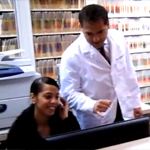 There’s a certain architectural balance to the structures that support your teeth. When the gums, the bone, and the periodontal fibers are balanced and properly positioned, the result is an attractive and natural smile that’s full of firmly rooted teeth. When this system is damaged by gum disease, the smile is no longer attractive and the teeth are certainly not stable.
There’s a certain architectural balance to the structures that support your teeth. When the gums, the bone, and the periodontal fibers are balanced and properly positioned, the result is an attractive and natural smile that’s full of firmly rooted teeth. When this system is damaged by gum disease, the smile is no longer attractive and the teeth are certainly not stable.
Fortunately, thanks to modern dental techniques, your periodontist can help to control the gum disease as well as restore the structural damage. With scaling and root planing, the plaque bacteria and tarter buildup can be removed, but this form of therapy alone cannot replace the lost gum tissue and bone. Instead, special surgical techniques may need to be employed in order to encourage the growth of the tissues that will support the teeth.
Where periodontal disease has contributed to bone loss and gum recession around the teeth, regenerative therapy serves two very important purposes. With the use of specially formulated proteins and other biocompatible materials, it is possible to stimulate the growth of the gums as well as the underlying jaw bone. Using this technique, your periodontist can also guide the development of the new tissues in order to restore the balance and structural integrity of these supporting tissues.
After periodontal surgery, the gum tissue and the underlying bone may begin to grow back at different rates. Guided tissue regeneration enables your dentist to control the growth of the hard and soft tissues during the healing process. Without this sophisticated technique, it is likely that the gum tissue would shrink down around the root of the tooth before the underlying bone has a chance to grow into place. The undesirable result would be a defect in the bone, an unevenly shaped gumline, and an unattractive smile.
Our skilled team of periodontists is committed to the health, preservation, and restoration of the hard and soft structures that support your teeth. To learn more about your surgical options for the treatment of advanced gum disease, call 212-756-8890 to schedule your consultation today.


